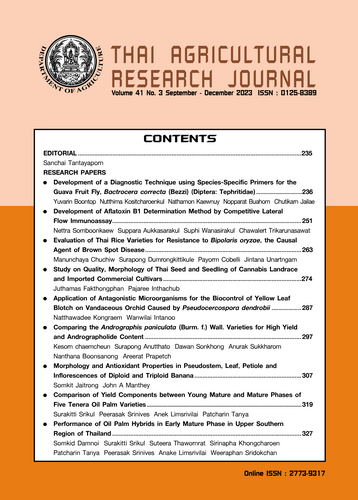Evaluation of Thai Rice Varieties for Resistance to Bipolaris oryzae, the Causal Agent of Brown Spot Disease
DOI:
https://doi.org/10.14456/thaidoa-agres.2023.22Keywords:
Rice, brown spot disease, resistance, Bipolaris oryzaeAbstract
Brown spot disease of rice is caused by the fungus Bipolaris oryzae. This fungal pathogen could infect leaves, leaf sheaths, panicles, and seeds. The use of resistant varieties is an effective and safe way for farmers. However, the resistance will change when the new fungal strains invades the area. This study aimed to determine the resistance of rice varieties to three isolates of B. oryzae. The combined analysis of ITS rDNA, 28S rDNA, and GAPDH revealed that these isolates had clustered sequences similar to those of the type species of B. oryzae. The resistant screening of 72 rice varieties to the three isolates of B. oryzae and cluster analysis UPGMA showed consistent results. Results revealed that Homsuphan displayed resistance (R) and moderate resistance (MR) while RD29 and Niao Dam displayed high susceptibility (HS) to all three isolates. The information was useful for future rice breeding programs for brown spot disease resistance.
References
จินตนา อันอาตม์งาม. 2562. เทคนิควิจัยเชื้อราสาเหตุโรคพืช. พิมพ์ครั้งที่ 1. ศูนย์ส่งเสริมและศึกอบรมการเกษตรแห่งชาติ มหาวิทยาลัยเกษตรศาสตร์
วิทยาเขตกำแพงแสน, นครปฐม.
ดารา เจตนะจิตร นงรัตน์ นิลพานิชย์ พากเพียร อรัญนารถ วิชิต ศิ ริสันธนะ วิชชุดา รัตนากาญจน์ รัศมี ฐิติเกียรติพงศ์ วันชัย โรจนหัสดิน และ ธัญลักษณ์อารยาพันธ์. 2550. โรคข้าวและการป้องกันกำจัด. พิมพ์ครั้งที่ 1. โรงพิมพ์ชุมนุมสหกรณ์การเกษตรแห่งประเทศไทย จำกัด กรุงเทพฯ.
ปราโมทย์ เข็มขาว ปวีณา คนยงค์และ นิธิมา รัตติโชติ. 2562. โรค แมลงศัตรูข้าวและการป้องกันกำจัด. พิมพ์ครั้งที่ 1. กรมส่งเสริมการอารักขาพืชและจัดการดินปุ๋ยกรมส่งเสริมการเกษตร,กรุงเทพฯ.
รุจิรัตน์ วงษ์จันทร์แดง สมใจ สาลีโท พุธชาติ ศรีพนม พรพิมล ต่ออำนาจ และพยอม โคเบลลี่. 2563. การประเมินความต้านทานของพันธุ์สายพันธุ์ข้าว ต่อโรคใบจุดสีน้ำตาลจากเชื้อรา Bipolaris oryzae. หน้า 25 - 28 ใน: เอกสารประกอบการประชุมวิชาการข้าวและธัญพืชเมืองหนาวประจำปี 2563. กรมการข้าว วันที่ 18 - 20 กุมภาพันธ์ 2563. ณ โรงแรมราชาวดีรีสอร์ท แอนด์โฮแทล อ. เมือง จ. ขอนแก่น.
อัญชลี ตาคำ กุลชนา ดาร์เวล วันพร เข็มมุกด์ ปิยะพันธ์ ศรีคุ้ม ทองมา มานะกุล และ กันติศา โมตาลี. 2563. การจำแนกเชื้อรา Bipolaris spp. จากอาการของโรคเมล็ดด่างในภาคเหนือตอนบนด้วยเทคนิคชีวโมเลกุลและความสัมพันธ์ต่อการเกิดโรคบนข้าว. วารสารวิชาการข้าว. 11: 80-88.
Deng, H., Y.P. Tan, R.G. Shivas and Y.C. Niu. 2015. Curvularia tsudae comb. nov. et nom. nov., 88 Thai Rice Research Journal, Vol. 11 No. 1, January - June 2020 formerly Pseudocochliobolus australiensis, and a revised synonymy for Curvularia australiensis. Mycoscience. 56(1): 24-28.
Hammer, O., D. A. Harper, and P. D. Ryan. 2001. Palaeontological statistics software package for education and data analysis. Palaeontologia Electronica. 4(1): 9.
International Rice Research Institute (IRRI). 2013. Standard Evaluation System (SES) for Rice. 5th ed. IRRI, Manila.
Kurtzman, C. P. and C. J. Robnett. 1997. Identification of clinically important ascomycetous yeasts based on nucleotide divergence in the S’end of the large-subunit (26S) ribosomal DNA gene. Microbiol. 35(5): 1216-1223.
Larkin, M.A., G. Blackshields, N.P. Brown, R. Chenna, P.A. McGettigan, H. McWilliam, F.Valentin, I.M. Wallace, A. Wilm, R. Lopez, J.D. Thompson, T.J. Gibson and D.G. Higgins. 2007. Clustal W and Clustal X version 2. Bioinformatics. 23(21): 2947-2948.
Manamgoda, D.S., L, Cai, EHC, McKenzie, P. W. Crous, H. Madrid, E. Chukeatirote, R. G. Shivas, Y. P. Tan and K. D. Hyde. 2012. A
phylogenetic and taxonomic re-evaluation of the Bipolaris - Cochliobolus - Curvularia complex. Fungal Diversity. 56: 131–144.
McMaugh, T. 2005. Guidelines for Surveillance for Plant Pests in Asia and the Pacific. ACIAR Monograph No. 119, ACIAR, Canberra.
Schoch, C. L., K. A. Seifert, S. Huhndorf, V. Robert, J. L. Spouge, C. A. Levesque, W. Chen and Fungal Barcoding Consortium Author List. 2012. Nuclear ribosomal internal spacer (ITS) region as a universal DNA barcode marker for Fungi. Proceedings of the National Academy of Sciences. 109 (16): 6241-6246.
White, T.J., T. Bruns, S. Lee and J. Taylor. 1990. Amplification and direct sequencing of fungal ribosomal RNA genes for phylogenetics. pp. 315-322. In: M.A. Innis, D.H. Gelfand, J.J. Sninsky and T.J. White (eds.). PCR Protocols: A Guideto Methods and Applications. Academic Press, New York. 482 p.
Yap, I. and R.J. Neison. 1996. Winboot: A Program for Performing Bootstrap Analysis of Binary Data to Determine the Confidence Limits of UPGMA-Based Dendrograms. IRRI Discussion Paper Series 14. International Rice Research Institute, Manila, Philippines.
Zimand, G., L. Valinsky, Y. Elad, I. Chet and S. Manulis.1994. Use of the RAPD procedure for the identification of Trichoderma strains. Myco. Res. 98(5): 531-534
Downloads
Published
How to Cite
Issue
Section
License
Copyright (c) 2023 Thai Agricultural Research Journal

This work is licensed under a Creative Commons Attribution-NonCommercial-NoDerivatives 4.0 International License.
Thai Agricultural Research Journal



